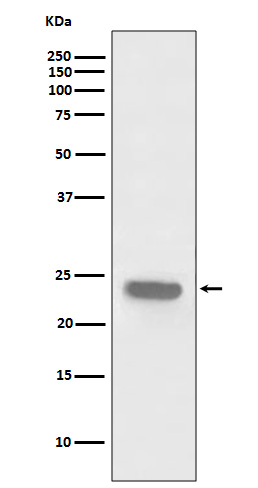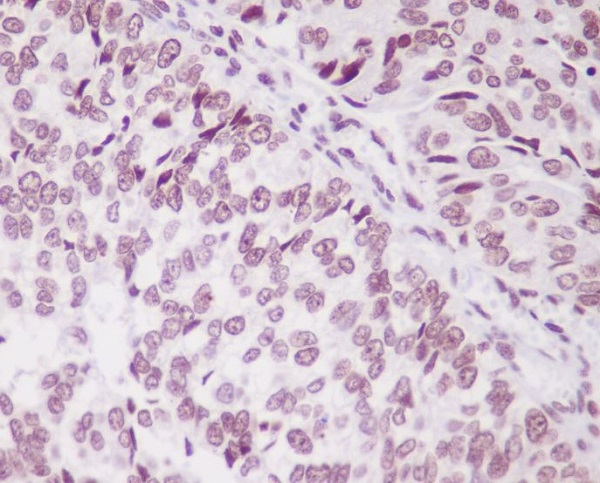

| WB | 1/500-1/1000 | Human,Mouse,Rat |
| IF | 1/20 | Human,Mouse,Rat |
| IHC | 1/50-1/100 | Human,Mouse,Rat |
| ICC | 1/50-1/200 | Human,Mouse,Rat |
| FCM | 1/50-1/100 | Human,Mouse,Rat |
| Elisa | 咨询技术 | Human,Mouse,Rat |
| Aliases | PARK7; Protein DJ-1; Oncogene DJ1; Parkinson disease protein 7 |
| Entrez GeneID | 11315 |
| WB Predicted band size | Calculated MW: 20 kDa; Observed MW: 20 kDa |
| Host/Isotype | Rabbit IgG |
| Antibody Type | Primary antibody |
| Storage | Store at 4°C short term. Aliquot and store at -20°C long term. Avoid freeze/thaw cycles. |
| Species Reactivity | Human,Mouse,Rat |
| Immunogen | A synthesized peptide derived from human PARK7 |
| Formulation | Purified antibody in PBS with 0.05% sodium azide. |
+ +
以下是3篇关于PARK7/DJ-1抗体的参考文献及其摘要概括:
---
1. **文献名称**: *DJ-1 (PARK7) mutations and mitochondrial dysfunction in Parkinson's disease*
**作者**: Canet-Avilés, R.M., et al.
**摘要**: 该研究利用PARK7/DJ-1特异性抗体,通过免疫印迹和免疫组化分析发现,DJ-1突变导致线粒体功能异常,并证实其在帕金森病中通过调控氧化应激反应发挥作用。
2. **文献名称**: *Immunohistochemical analysis of DJ-1 expression in glioblastoma*
**作者**: Hod, Y., et al.
**摘要**: 通过DJ-1抗体对胶质母细胞瘤组织进行免疫组化染色,发现DJ-1蛋白在肿瘤细胞中高表达,提示其可能作为癌症诊断标志物或治疗靶点。
3. **文献名称**: *Redox-sensitive interaction between DJ-1 and Nrf2 regulates antioxidant response*
**作者**: Clements, C.M., et al.
**摘要**: 使用DJ-1抗体进行免疫共沉淀实验,揭示了DJ-1通过结合Nrf2调控细胞抗氧化通路,其功能缺失导致氧化损伤加剧,与神经退行性疾病相关。
---
以上文献均通过特异性抗体探究PARK7/DJ-1在疾病机制中的功能,涵盖神经退行性疾病、癌症及氧化应激等领域。如需具体期刊信息或发表年份,可进一步补充检索。
The PARK7 gene, also known as DJ-1. encodes a highly conserved protein implicated in cellular oxidative stress response, mitochondrial function, and neurodegeneration. First linked to early-onset Parkinson’s disease (PD) in 2003. mutations in PARK7/DJ-1 cause autosomal recessive PD through loss-of-function mechanisms. The DJ-1 protein acts as a redox-sensitive chaperone, stabilizing antioxidant pathways and modulating proteasomal activity. Its neuroprotective role involves scavenging reactive oxygen species (ROS) and regulating transcriptional processes tied to neuronal survival.
PARK7/DJ-1 antibodies are essential tools for studying its expression, localization, and dysfunction in disease models. These antibodies target specific epitopes of the 20 kDa DJ-1 protein, enabling applications like Western blotting, immunohistochemistry, and ELISA. Researchers use them to investigate DJ-1's downregulation or aggregation in PD brains, its interaction with α-synuclein or LRRK2. and its role in cancer or metabolic disorders. Monoclonal and polyclonal variants are available, often validated in knockout cell lines to confirm specificity. Some antibodies distinguish pathogenic mutants (e.g., L166P) from wild-type DJ-1. aiding mechanistic studies. Cross-reactivity with homologs in model organisms (e.g., mice, Drosophila) supports translational research. Quality-controlled PARK7/DJ-1 antibodies remain critical for advancing insights into PD pathogenesis and therapeutic strategies targeting oxidative stress pathways.
×